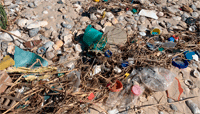
Plastics of all shapes & sizes litter Texas Beached. -Celeste Silling
Texas beaches are a magnet for trash. Beach-goers leave their fishing line and food containers on the sand, storms bring trash from inland out to the coast, and waves and currents bring trash from the Gulf of Mexico to the shores of Texas. This trash in our waters and on our shores is known as marine debris and it is a massive problem for wildlife.
All marine debris is a problem, but certain items cause more harm than others. Plastics are possibly the most troublesome pieces of debris for a variety of reasons. They can last an incredibly long time in the ocean; plastic bags take around 20 years to fully disintegrate in the ocean, while plastic bottles take about 450 years.
Bags, bottles and other plastic items are usually colorful and lightweight, so they can float in the water without sinking to the bottom. To marine animals, this debris can look a lot like food. Turtles are famous for eating plastics thinking that they are jellyfish. You can commonly find plastics on Texas beaches with turtle bites taken out of them.
When animals eat plastic, it does a number on their digestive tract. Sharp edges cut soft tissues, injuring the creature from inside. Often, the plastics are too big or plentiful to pass through their digestive systems, so they remain inside. If enough plastics accumulate, the animal is unable to eat and digest, and so it starves.
Entanglement is an issue as well. Animals both in the water and on the beach get tangled up in fishing line, nets, or other strings-like materials and can’t escape. This prevents them from hunting or foraging and can cause cuts and infection. Fishing line in particular lasts about 600 years in the ocean and can easily tangle around the legs of birds on the beach, eventually causing death.
There are plenty of other ways that marine debris can harm animals or the ecosystem, but don’t fear! There are also plenty of ways we can help end this problem! Trash gets into the ocean from landfills, trash cans, sewers and so on, so even if you live far from the beach you can help by reducing your trash. You can bring reusable shopping bags to the store instead of using the plastic ones. You can use a reusable bottle instead of buying bottled water. You can buy products that use less plastic packaging and recycle the packaging that you do use.
You can also clean up our Texas beaches. Doing a trash cleanup either by yourself, with your family, or with a whole team can make an enormous difference for Texas wildlife. The amount of trash on a beach might seem insurmountable, but with a little time and effort we can make a huge dent. At a recent cleanup on Bolivar Peninsula, 40 volunteers picked up nearly 1000 lbs of trash in only a few hours.
Together with American Bird Conservancy and Black Cat GIS, we at Gulf Coast Bird Observatory are focused on cleaning up Texas shorelines through a new program called S.P.L.A.Sh. (Stopping Plastic and Litter Along Shorelines). This December, we are asking Texans to give a gift back to the coast and pick up marine debris while social distancing, alone or with those you can safely gather with! If you are interested in learning more about how you can participate, please contact Celeste at csilling@gcbo.org or Kelly at kmartin@abcbirds.org. We hope to see you out there! Together we can solve the problem of marine debris.
